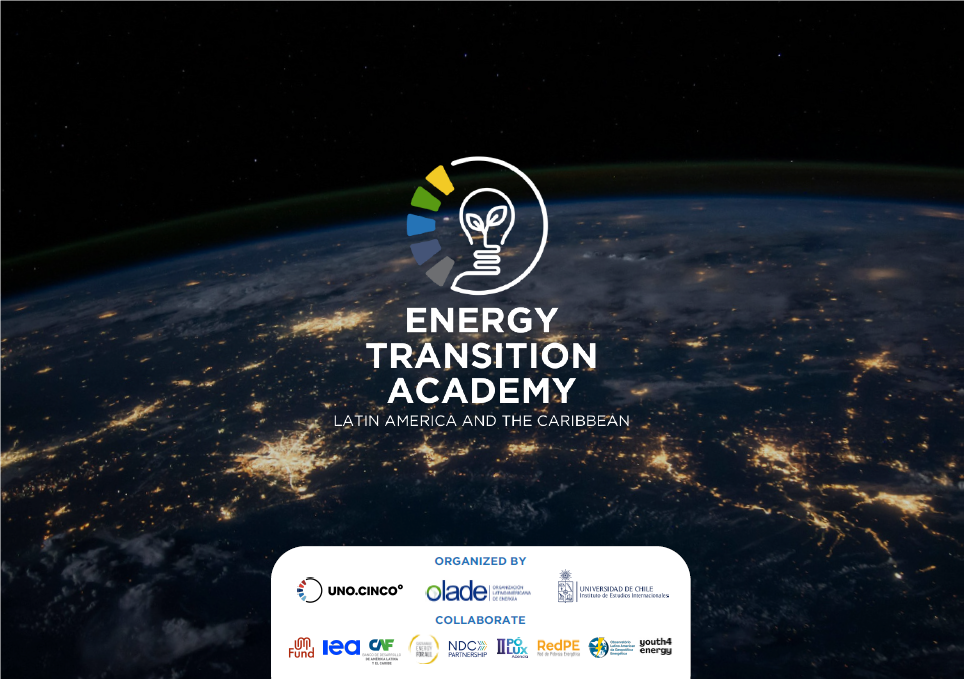Energy Transition Academy

What is it?
The Energy Transition Academy of Latin America and the Caribbean is a free course aimed at people interested in the energy sector from the age of 18, with no upper age limit. At the end of the program, participants will receive a certificate of participation awarded by the University of Chile.
What is the purpose of the program?
The objective is to train technical and theoretical skills by enhancing knowledge about the energy transition in Latin America. In addition, it aims to prepare a diverse audience for the process of updating the Nationally Determined Contributions (NDC) in the countries of the region, inviting the active participation of citizens in the energy transition.
Motivation
Latin America and the Caribbean face a crossroads in their energy landscape, characterized by a deep-rooted dependence on fossil fuels that has accentuated environmental and climate challenges in the region.
Despite its wealth of natural resources such as solar radiation and wind energy, the current energy matrix has contributed to significant greenhouse gas emissions, extreme weather events and biodiversity loss, highlighting the pressing need for a transition to more sustainable energy sources.
Key challenges include the lack of specialized technical capacity in energy transition, resistance to change in traditional sectors, and gender inequality in the energy field.
Updating Nationally Determined Contributions (NDCs) is presented as an essential step to meet international commitments, such as the Paris Agreement, and align national policies with global climate goals.
In response to these challenges, the Energy Transition Academy is an ambitious initiative that seeks to train actors and stakeholders in the region with the aim of equipping a diverse audience with up-to-date technical knowledge, empowering and encouraging citizen participation, and ensuring equitable gender representation in energy transition policies, especially in the process of updating NDCs with a focus on energy.
Description of the Academy
The Energy Transition Academy Latin America and the Caribbean (ATE LATAM & C) seeks to bring the energy sector closer to youth, civil society, professionals and anyone interested, with the objective of generating capacities from an early stage with a comprehensive and long-term vision, while encouraging critical thinking of students.
ATE LATAM & C seeks to facilitate and enhance environmental information and education in Latin America and the Caribbean to achieve greater collective action on climate change and sustainable development.
This program seeks to review the different aspects that influence or affect the energy transition, such as the economic, technological, social, innovative and political spheres, generating in students a critical attitude towards energy development in the region and in their countries.
Regarding the academic program, each of the 8 sessions has a duration of 90 minutes and consists of two lectures presented by leading professionals in the field, giving space for questions and answers. Additionally, our students will have 4 reinforcement meetings whose main objective is to induce the analysis of the topics of the academic program and discuss how they envision their development in the medium and long term. They will also have 4 meetings to elaborate the final product of the course, related to an analysis of the energy transition and its public policies, focusing on the Nationally Determined Contributions (NDC) and its mention in energy.
At the end of the course, an illustrated report is generated that compiles all the group work elaborated by our students and a summary of the 13 classes taught in the sessions, with the objective of disseminating knowledge related to the energy transition in the region.
Main Objective
The main objective of the ATE LATAM & C is to empower people to get involved in the different factors and aspects related to the energy transition, generating a comprehensive environment of reflection and learning among students about the development of this transition, which considers environmental, technical, economic and, above all, social factors, seeking to accelerate fair climate action in the region and the world.
Specific objectives
- Increased awareness and understanding of the importance of the energy transition.
- Increased technical capacities to contribute to citizen participation in public policies, especially in the process of updating the NDCs.
- Active participation and continuous engagement in decision making related to energy and the environment.
- Significant contribution in the promotion of gender equity in the energy field, especially in the empowerment of the leadership of professional women in the energy sector.
- ATE LATAM & C seeks that its students generate links between them in order to provide them with the opportunity to initiate or enhance their work in the energy transition, promoting awareness and collective commitment.
